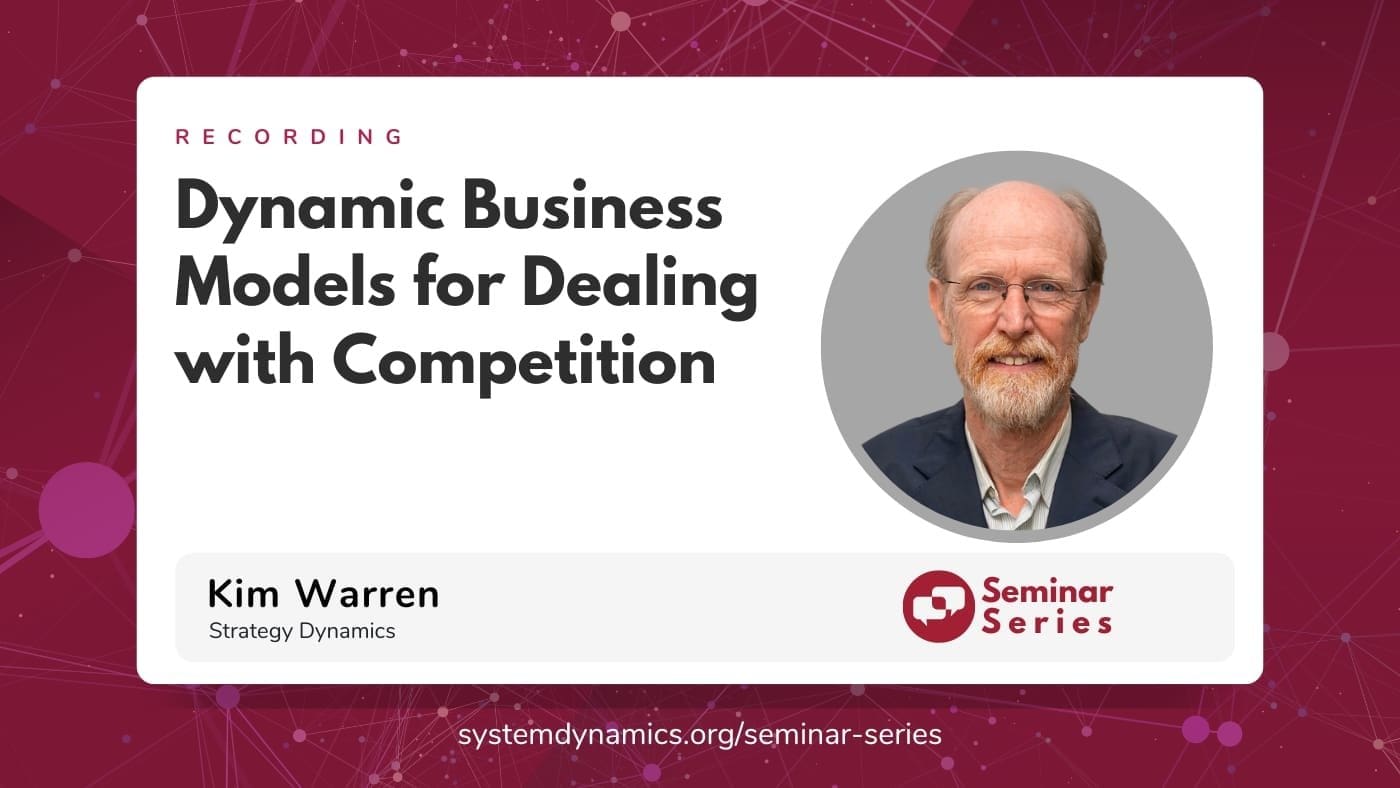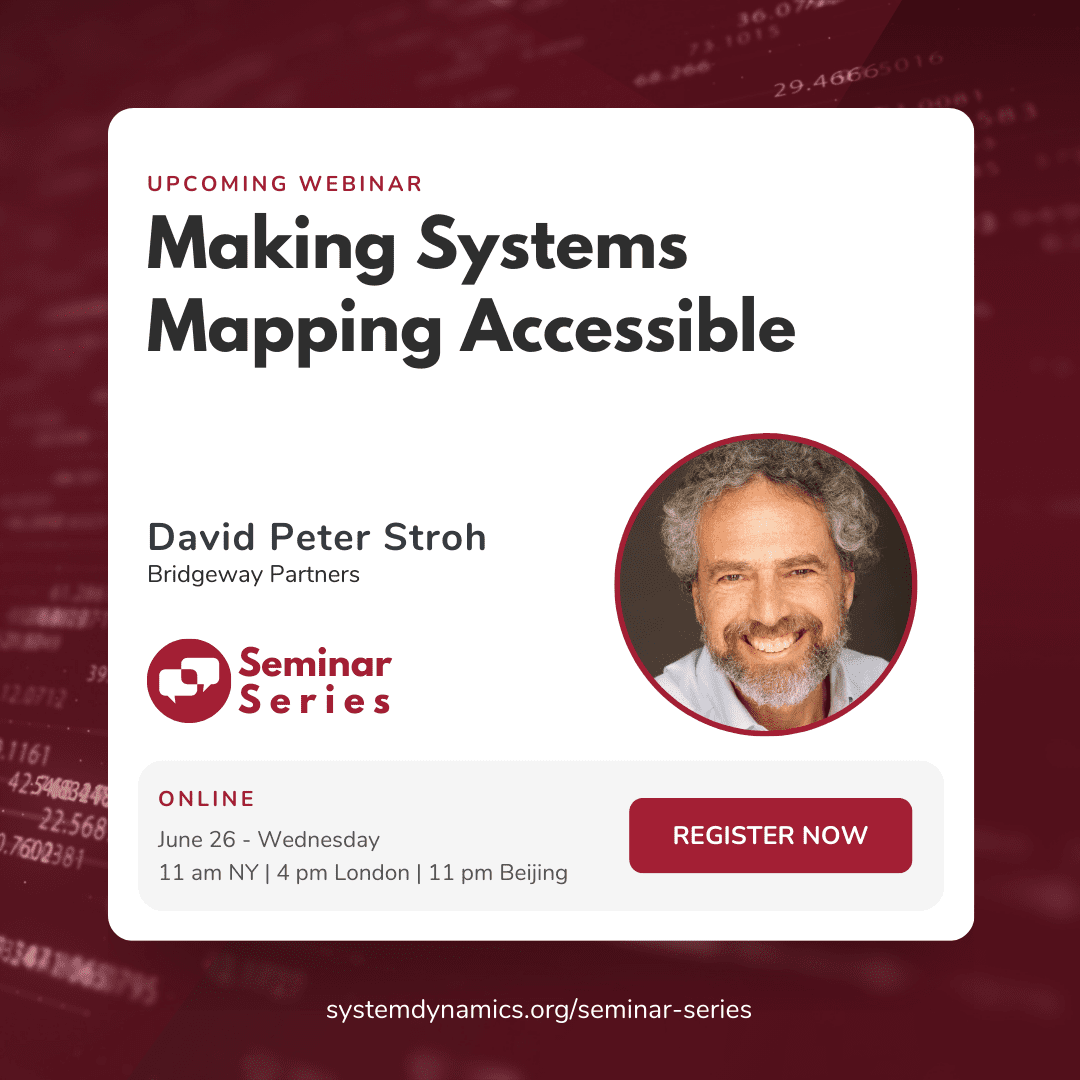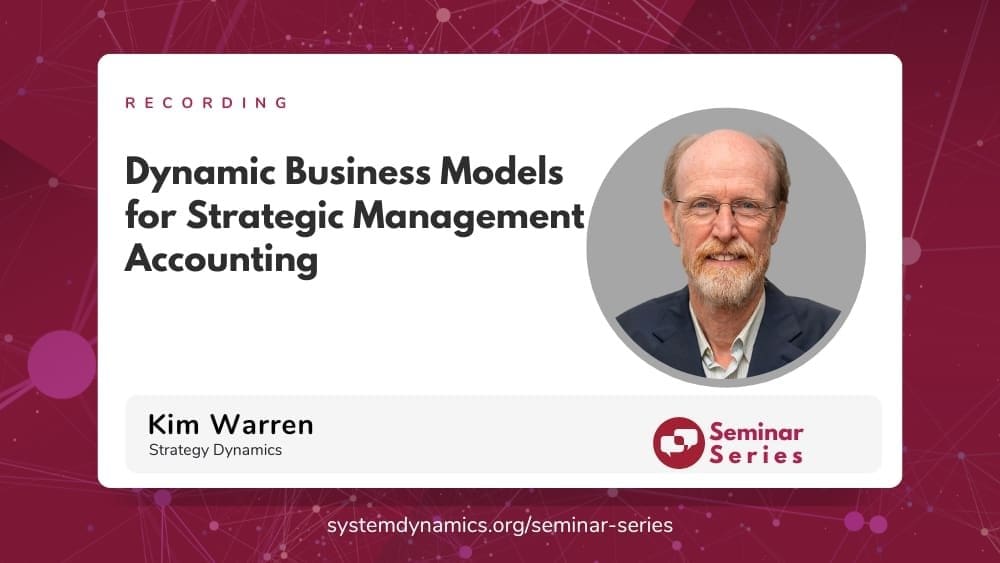Dynamic Business Models for Dealing with Competition
In the latest webinar of the System Dynamics for Business Innovation special series, Kim Warren delved into Dynamic Business Models for Dealing with Competition. This session, rich in practical advice and strategic insights, is pivotal for professionals seeking to sharpen their competitive edge. Here’s a breakdown of the webinar’s key points.
Key Takeaways from the Webinar:
- Understanding Competitive Dynamics: The session focused on the use of dynamic business models to navigate competitive business environments. Warren highlighted the importance of understanding how competition plays out in real-time and the impacts on prices, marketing spending, and profits.
- Case Studies and Applications: Warren used two illustrative case studies to demonstrate the practical application of these models. He discussed GSK’s travel vaccines business and its response to a new competitor, and Beyond Meat’s strategy in creating a market for non-meat products. Both cases highlighted the strategic challenges and responses in dynamic competitive environments.
- Types of Competition: Warren outlined three standard competition mechanisms, covering most competitive scenarios. These include racing to capture new potential customers, maintaining existing customers while attracting competitors’ customers, and handling situations where customers can switch between suppliers.
- Practical Strategy Development: The session also touched upon practical aspects of strategic planning, like leveraging dynamic models for both long-term strategy and short-term operational decision-making.
Invitation for Further Learning
This webinar is a must-watch for those interested in refining their competitive strategies and understanding the application of dynamic business models. Viewing the recording will provide a deeper insight into the discussed concepts.
Furthermore, the series will continue to offer rich content on strategic business areas such as IT systems architecture and environmental impact reporting. These upcoming sessions represent a unique opportunity to gain advanced knowledge and skills in the field.
Join us for the upcoming webinars to deepen your understanding of dynamic business models and their critical role in shaping successful competitive strategies
Certificate
Attendees who participate in at least 6 out of the 9 webinars in the series will be eligible to receive a certificate titled “Introduction to Dynamic Business Models.” This is an opportunity to gain recognition of your learning in this innovative field. For those who cannot attend live sessions, recordings will be available, allowing you to review the material and complete the series at your convenience.
Watch the recording to get your certificate code.
Watch the recording below
Whoops, this recording is available for members and ticket purchasers only. Please login to verify. If you’re not a member, purchase a membership here. You can also buy a ticket to watch the recording here.
About the Speaker
Kim Warren is an experienced strategy professional, teacher, and publisher of online courses and teaching resources on business modeling – fast becoming a mainstream capability for executives, consultants, and business students. He was awarded the Jay Wright Forrester Award by the International System Dynamics Society in 2005 and was the Society’s President in 2013.
Recent Posts
2023 PwC Mark Paich Hackathon Highlights
Dive into the 2023 PwC Mark Paich Hackathon’s exhilarating journey! From AI advancements to health tech innovations, discover the ideas shaping our future.
A Close-Up on Our New Look
Discover the inspiration and process behind the System Dynamics Society’s new logo and branding, reflecting its commitment to advancing the field and fostering global collaboration
Celebrating Women’s International Day
A compilation of System Dynamics and Systems Thinking publications by women. Happy International Women’s Day!
Upcoming Events
China Chapter Annual Meeting
Join us for the Annual Meeting of the China Chapter! Note: RSVP to access the link. You do NOT need a conference registration to attend this meeting virtually.
Recent Business cases
System Dynamics Unravels ICU Tensions at the Portuguese Oncology Institute
Portuguese Oncology Institute Enhances Patient Care and Resource Management for an Oncology Intensive Care Unit diminishing mortality and turnover rates.
System Dynamics Helps Farmers Escape Poverty Trap in Guatemala
Guatemala’s government implements policies to support small-scale farming and counteract effects of climate change.
Twinings Uses System Dynamics Games to Enhance HR Capability
A one-day workshop helps business executives to improve communication, collaboration, and decision-making while giving them powerful strategies and insights.
Join us
Escape from Model Land – How Mathematical Models Can Lead Us Astray and What We Can Do About it
In the third episode of MINDS CAST, we had the privilege of engaging with Erica Thompson, the author of “Escape from Model Land” This session delved into the intricacies of using mathematical models in decision-making, highlighting both the potential benefits and the pitfalls of relying heavily on these models. Here, we summarize the key insights from this enlightening discussion, including Thompson’s perspectives on the role of models in understanding complex issues and the importance of critical engagement with these tools.
About the Presenter:
Dr. Erica Thompson, Associate Professor of Modelling for Decision Making at UCL’s Department of Science, Technology, Engineering, and Public Policy, brings a wealth of expertise to the topic. Her research focuses on the application of mathematical and computational models in decision-making, with a particular emphasis on developing techniques for assessing and interpreting models. As a Fellow of the London Mathematical Laboratory and a Visiting Senior Fellow at the LSE Data Science Institute, her work also delves into the philosophical aspects of model outputs and their integration with expert judgment in decision-making processes.
Webinar Overview:
- The Essence of Models in Decision-Making: Thompson opened the discussion by exploring the role of mathematical models in aiding our understanding of complex issues like economic regulation, climate change, and pandemics. She emphasized that while models are crucial tools, they do not produce perfect predictions of the future.
- Challenges in Mathematical and Social Contexts: The conversation highlighted the mathematical and social challenges in using models for decision-making. Drawing on examples from climate change and COVID-19, Thompson underscored the importance of recognizing the limitations and assumptions underlying these models.
- Best Practices for Responsible Modeling: The session also touched upon best practices for responsible modeling, especially in politically charged contexts. Thompson stressed the need for transparency, accountability, and the acknowledgment of value judgments embedded within models.
- Navigating Model Land: The concept of ‘Model Land’ – a metaphorical space where models exist in their idealized form – was a key focus. Thompson discussed the risks of becoming overly reliant on models and strategies for effectively navigating out of Model Land while still leveraging the benefits they offer.
Key Points from the Discussion:
- Model Diversity and Assumption Transparency: Thompson advocated for the diversity of models and perspectives in modeling processes. She emphasized the need for models to make their assumptions and biases explicit, allowing for more critical engagement and evaluation of their outputs.
- The Role of Experts in Modeling: The discussion also addressed the evolving concept of expertise in modeling. Thompson highlighted the importance of involving a range of experts in the modeling process to ensure diverse perspectives and assumptions are considered.
- Models as Conviction Narratives: Thompson described models as ‘conviction narratives,’ tools that provide a structured way of thinking about the future. She stressed the importance of understanding models as narratives that require translation and interpretation to be effectively used in decision-making.
- Future of Modeling: Looking ahead, Thompson envisioned a modeling landscape that is more integrally connected with social and political contexts. She called for models that are transparent about their value judgments and capable of incorporating diverse perspectives to enhance trust and utility in decision-making.
Erica Thompson’s insights in the MINDS CAST episode provide a valuable perspective on the complexities of mathematical modeling. Her emphasis on critical engagement, diversity of perspectives, and the need for transparency in modeling practices offers a roadmap for navigating the challenges and potentials of models in decision-making. As we continue to rely on models to understand and shape our world, Thompson’s call for a more nuanced and responsible approach to modeling is both timely and essential.
Watch the recording below
About the Speaker
Dr. Erica Thompson holds the position of Associate Professor of Modelling for Decision Making at UCL’s Department of Science, Technology, Engineering and Public Policy, where I work on a programme of research funded by a UKRI Future Leaders Fellowship. She is also a Fellow of the London Mathematical Laboratory, where she leads the research programme on Inference from Models, and a Visiting Senior Fellow at the LSE Data Science Institute.
Her research focuses on leveraging mathematical and computational models to guide decision-making in practical contexts. Dr. Thompson has dedicated her efforts to developing mathematical and statistical techniques for assessing and interpreting models. Additionally, she explores essential philosophical inquiries concerning the true significance of model outputs and the integration of models with expert judgement in decision-making processes.
Recent Posts
2023 PwC Mark Paich Hackathon Highlights
Dive into the 2023 PwC Mark Paich Hackathon’s exhilarating journey! From AI advancements to health tech innovations, discover the ideas shaping our future.
A Close-Up on Our New Look
Discover the inspiration and process behind the System Dynamics Society’s new logo and branding, reflecting its commitment to advancing the field and fostering global collaboration
Celebrating Women’s International Day
A compilation of System Dynamics and Systems Thinking publications by women. Happy International Women’s Day!
Upcoming Events
China Chapter Annual Meeting
Join us for the Annual Meeting of the China Chapter! Note: RSVP to access the link. You do NOT need a conference registration to attend this meeting virtually.
Recent Business cases
System Dynamics Unravels ICU Tensions at the Portuguese Oncology Institute
Portuguese Oncology Institute Enhances Patient Care and Resource Management for an Oncology Intensive Care Unit diminishing mortality and turnover rates.
System Dynamics Helps Farmers Escape Poverty Trap in Guatemala
Guatemala’s government implements policies to support small-scale farming and counteract effects of climate change.
Twinings Uses System Dynamics Games to Enhance HR Capability
A one-day workshop helps business executives to improve communication, collaboration, and decision-making while giving them powerful strategies and insights.
Join us
Making Systems Mapping Accessible
June 26 at 11 am NY | 4 pm London | 11 pm Beijing | Time Converter
From Text to Map: A System Dynamics Bot for Constructing Causal Loop Diagrams
May, 15 at 11 am NY | 4 pm London | 11 pm Beijing | Time Converter
From Text to Map: A System Dynamics Bot for Constructing Causal Loop Diagrams
Join us to delve into the innovative System Dynamics Bot, a tool designed to automate causal loop diagram creation from text. Learn how it performs in converting text to maps, see practical examples, and understand the challenges and solutions in its development.
Learning Outcomes:
- Gain insight into the capabilities of large language models in system dynamics and model building.
- Understand the effectiveness of the System Dynamics Bot in identifying key relationships within textual data.
- Discover the challenges encountered and solutions implemented during the development of this tool.
This webinar is ideal for system dynamics practitioners, data analysts, and anyone interested in the intersection of artificial intelligence and model building. Sign up to explore how this technology can streamline your modeling processes and enhance your understanding of complex systems.
About the Presenters
Niyousha Hosseinichimeh has a PhD and a master’s degree in public administration and policy from State University of New York at Albany, and a bachelor’s degree in mechanical engineering from Sharif University, Iran. She is currently an assistant professor at the Department of Industrial and Systems Engineering at Virginia Tech. Her research focuses on developing and applying methods to improve health and healthcare systems. She uses simulation models to help stakeholders improve their understanding and decision making in complex dynamic systems. She has applied system dynamics approach to diverse health issues including infant mortality, mental health, and alcohol impaired driving among teens. Her methodological contributions include expanding calibration methods for dynamic models and developing techniques for system dynamics group model building. Her research has been funded by the National Institute of Health, National Science Foundation, Agency for Healthcare Research and Quality, Ohio State Department of Health, and Burroughs Wellcome Fund.
Dynamic Business Models for Strategic Management Accounting
In the first session of the System Dynamics for Business Innovation special series, led by business strategist and academic Kim Warren, attendees gained valuable insights into the use of dynamic business models in strategic management accounting. This blog provides an overview of the key topics covered in the webinar ti
Key Points from the Webinar:
-
Role of Strategic Management Accounting (SMA): SMA is essential for helping accountants and leaders in developing and monitoring their business strategies. It requires detailed analysis of business data, forecasting, and preparing forward-looking reports.
-
Responding to Market Changes: Strategic Management involves reacting to unexpected competitive threats and market shifts. This includes strategies such as acquiring companies or entering new markets.
-
Use of Financial and Non-Financial Data: Strategic management requires ongoing analysis and interpretation of both financial and non-financial data. This encompasses aspects like capacity factors and their connections within the business.
-
Tools for SMA: SMA uses a combination of financial and non-financial tools. The Balanced Scorecard, for example, connects financial outcomes with operational activities and customer focus.
-
Customer Focus in Business Success: Understanding customer needs is important for business success. Tools like the value curve and the business model canvas help align business offerings with customer needs and set apart from competitors.
-
Budgeting Techniques: The webinar discussed traditional and zero-based budgeting, underlining the need for budgeting approaches that suit current business requirements.
-
Tools for Predictive Analysis: It’s important to have tools that can forecast business outcomes in various scenarios. These tools should consider factors such as revenue, competitor behavior, and strategic objectives.
-
Case Study Application: The webinar demonstrated these concepts through a case study of a new table service restaurant, focusing on sales and profit growth projections.
Invitation for Further Learning:
For those interested in deepening their understanding of Strategic Management Accounting, we recommend watching the recording of this webinar. Further, participation in the upcoming sessions of this series will offer expanded knowledge on topics like competitive strategy, IT systems, and the impact of business decisions on society and the environment.
Join us to further explore the field of Strategic Management Accounting and apply these principles to enhance your business strategies.
Certificate
Attendees who participate in at least 6 out of the 9 webinars in the series will be eligible to receive a certificate titled “Introduction to Dynamic Business Models.” This is an opportunity to gain recognition of your learning in this innovative field. For those who cannot attend live sessions, recordings will be available, allowing you to review the material and complete the series at your convenience.
Watch the recording to get your certificate code.
Watch the recording below
Whoops, this recording is available for members and ticket purchasers only. Please login to verify. If you’re not a member, purchase a membership here. You can also buy a ticket to watch the recording here.
About the Speaker
Kim Warren is an experienced strategy professional, teacher, and publisher of online courses and teaching resources on business modeling – fast becoming a mainstream capability for executives, consultants, and business students. He was awarded the Jay Wright Forrester Award by the International System Dynamics Society in 2005 and was the Society’s President in 2013.
Resoures:
Recent Posts
2023 PwC Mark Paich Hackathon Highlights
Dive into the 2023 PwC Mark Paich Hackathon’s exhilarating journey! From AI advancements to health tech innovations, discover the ideas shaping our future.
A Close-Up on Our New Look
Discover the inspiration and process behind the System Dynamics Society’s new logo and branding, reflecting its commitment to advancing the field and fostering global collaboration
Celebrating Women’s International Day
A compilation of System Dynamics and Systems Thinking publications by women. Happy International Women’s Day!
Upcoming Events
China Chapter Annual Meeting
Join us for the Annual Meeting of the China Chapter! Note: RSVP to access the link. You do NOT need a conference registration to attend this meeting virtually.
Recent Business cases
System Dynamics Unravels ICU Tensions at the Portuguese Oncology Institute
Portuguese Oncology Institute Enhances Patient Care and Resource Management for an Oncology Intensive Care Unit diminishing mortality and turnover rates.
System Dynamics Helps Farmers Escape Poverty Trap in Guatemala
Guatemala’s government implements policies to support small-scale farming and counteract effects of climate change.
Twinings Uses System Dynamics Games to Enhance HR Capability
A one-day workshop helps business executives to improve communication, collaboration, and decision-making while giving them powerful strategies and insights.





